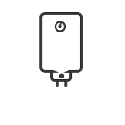One of the main uses for cleaning products is washing clothes and dishes. Each load of clothes and dishes requires water, and energy is often used to heat that water. While one load of laundry or dishes may seem like a small task, when you consider all the times we run the washing machine or dishwasher in a week and multiply that by all the households doing the same thing, it adds up!
The good news is that our washing machines and dishwashers are getting more efficient. In the U.S., a new clothes washer in 2017 used 70% less energy than in 1990, and a new dishwasher in 2017 used 40% less energy that in 1990. (DOE). In addition, many cleaning product companies are joining us in striving to stay within the 1.5°C warming pathway and reach net-zero global emissions by 2050.
What the Industry is Doing to Help
While the products we use and the machines in our home have become more efficient, there are still things we can do to reduce the energy footprint when we use appliances or wash by hand. The choices we make every day matter for the long-term health of the planet!
Energy Saving Tips:
Cleaning Habits
Lower the Temp
A higher temperature does not always mean cleaner. Reducing the temperature can have a dramatic effect on energy use, as well as help preserve your clothes.
Know Your Brand
Whether you choose a concentrated product, a refillable product or something else, look for options from the brands you trust that minimize its carbon footprint.
Limit Extra Washing
As much as possible, try to get it clean the first time and avoid re-washing the same items again. Re-washes means using double the energy!
Consider Drying Options
Machine drying is energy intensive. When possible, consider line-drying your clothes. With dishes, skip the heated dry and let them dry naturally.
Consider Cloth
When wiping off counter tops and other surfaces, consider using a clean rag or microfiber cloth instead of a paper towel.
Aim for Full Loads
Get the most out of your wash by running the appropriate size loads of laundry. If you are going to use energy to run the machine, best to be as efficient as possible and make use of the space.
Reduce the Need for Ironing
Ironing takes even more energy. Try to avoid clothing wrinkles by removing items from the dryer and hanging immediately after it has shut off.
Home Energy Use
Maintain and Upgrade Appliances
Your appliances will perform best if kept well maintained. Always clean the dryer's lint screen after each low to keep it running efficiently. Replace with newer energy-efficient models as they wear out.
Maintain Your Water Heater
Your water heater will perform best if kept well maintained. Consider insulating, following manufacturer recommendation. When it needs replacing, choose an energy-efficient model.
Consider Alternative Energy
Your appliances will perform best if kept well maintained. Always clean the dryer's lint screen after each low to keep it running efficiently.
Purchase Carbon Credits
Your appliances will perform best if kept well maintained. Always clean the dryer's lint screen after each low to keep it running efficiently.
Look Elsewhere in Your Life
Your appliances will perform best if kept well maintained. Always clean the dryer's lint screen after each low to keep it running efficiently.












